Plot summary
The book begins with the aftermath of the last book as Cato and Macro recover from their injuries in the Atrebatan capital city of Calleva. The Durotrigans are still at large raiding the Roman supply lines in Atrebatan territory. The Legate Vespasian with a small bodyguard come to investigate the stop of the supply lines, but is caught up in a skirmish to save a caravan of supplies. The raiders are only just fended off with most of the guards killed. The Atrebatan king, Verica, demands that Vespasian leave troops to protect the kingdom. Vespasian is unable to leave troops, but instead has Centurions Macro and Cato to train local troops. The two make good progress training two cohorts of locals as Roman troops. The two cohorts are named the Wolves and the Boars, and in their first combat action, ambush a Durotrigan raiding party of some 500 men, resulting in a much-needed victory. In light of such success General Plautius is worried that arming disloyal locals would endanger his rear flank against Caracutus and sends a Tribune Quintillus with procurator powers to assess the situation.
The situation at Calleva is dangerous as the locals are questioning whether they should be aiding the British resistance instead of Rome. Internal politics run rife and an assassination attempt is made on the King, who is grievously injured in the attempt. The Boars and Wolves are called to attack a raiding party, but it is revealed to be a trap. The army routs and most of the troops are massacred before they make it back to Calleva. Only around 200-odd of the 960 men escape back into the city. Tincommius, the king's "loyal" nephew is revealed to be the would-be assassin and has set siege to the city in a power play with the Durotrigans. Cato and Macro's men are forced to abandon the walls and fall back to the royal enclosure as the enemy numbers overwhelm the loyalist army. The Legate Vespasian's relief forces soon arrive to drive the enemy from the city, only to abandon it after hearing news of Caracutus' superior flanking force. Forced into battle Vespasian's forces attempt a last stand against the British onslaught, only to be saved by the pursuing forces of General Plautius. Victory is snatched from the jaws of defeat. The novel finishes with the Atrebatan Kingdom annexed regardless and the remaining Boars and Wolves disbanded. Centurion's Macro and Cato are left with another set of medals and reinstatement to the 3rd Cohort, with Cato commanding the 6th Century.
The Roman legion, the largest military unit of the Roman army, was composed of Roman citizens serving as legionaries. During the Roman Republic the manipular legion comprised 4,200 infantry and 300 cavalry. After the Marian reforms in 107 BC the legions were formed of 5,200 men and were restructured around 10 cohorts, the first cohort being double strength. This structure persisted throughout the Principate and middle Empire, before further changes in the fourth century resulted in new formations of around 1,000 men.

AD 66 (LXVI) was a common year starting on Wednesday of the Julian calendar. At the time, it was known as the Year of the Consulship of Telesinus and Paullinus. The denomination AD 66 for this year has been used since the early medieval period, when the Anno Domini calendar era became the prevalent method in Europe for naming years.

The Praetorian Guard was an elite unit of the Imperial Roman army that served as personal bodyguards and intelligence agents for the Roman emperors.

The Battle of Thapsus was a military engagement that took place on April 6, 46 BC near Thapsus. The forces of the Optimates, led by Quintus Caecilius Metellus Scipio, were defeated by the forces of Julius Caesar. It was followed shortly by the suicides of Scipio and his ally, Cato the Younger, the Numidian king Juba, and his Roman peer Marcus Petreius.
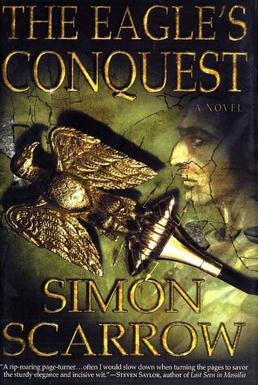
The Eagle's Conquest is a 2001 novel by Simon Scarrow, about the Roman invasion of Britain in 43 AD. It is the second book in the Eagles of the Empire series.

In the Roman army during classical antiquity, a centurion, was a commander, nominally of a century, a military unit originally consisting of 100 legionaries. The size of the century changed over time, and from the first century BC through most of the imperial era was reduced to 80 men.

Simon Scarrow is a British writer. Scarrow completed a master's degree at the University of East Anglia after working at the Inland Revenue, and then went into teaching as a lecturer, firstly at East Norfolk Sixth Form College, then at City College Norwich. Simon is a patron of the Bansang Hospital Appeal which supports an outstandingly innovative hospital in The Gambia.
The Battle of Bedriacum refers to two battles fought during the Year of the Four Emperors near the village of Bedriacum, about 35 kilometers (22 mi) from the town of Cremona in northern Italy. The fighting in fact took place between Bedriacum and Cremona, and the battles are sometimes called "First Cremona" and "Second Cremona".
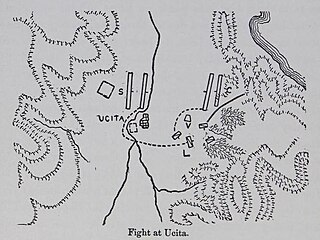
The Battle of Utica in Caesar's Civil War was fought between Julius Caesar's general Gaius Scribonius Curio and Pompeian legionaries commanded by Publius Attius Varus supported by Numidian cavalry and foot soldiers sent by King Juba I of Numidia. Curio defeated the Pompeians and Numidians and drove Varus back into the town of Utica.
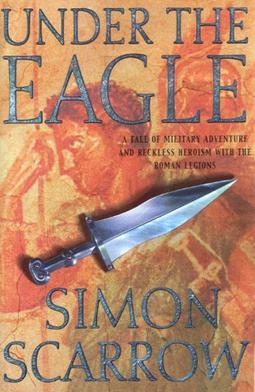
Under the Eagle is the first book in the Eagles of the Empire series, by Simon Scarrow and is his debut novel, introducing the characters of Quintus Licinius Cato and Lucius Cornelius Macro. It was published in 2000.
Titus Flavius T. f. T. n. Sabinus was a Roman politician and soldier. A native of Reate, he was the elder son of Titus Flavius Sabinus and Vespasia Polla, and brother of the Emperor Vespasian.
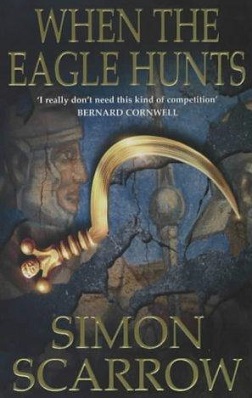
When the Eagle Hunts is a 2002 novel by Simon Scarrow, set in 44 AD during the Roman invasion of Britain. It is the third book in the Eagles of the Empire series.

Eagles of the Empire is a series of historical military fiction novels written by Simon Scarrow. The series began in July 2000 with the publication of Under the Eagle, and as of March 2022 there have been 21 novels released in the series, with the 22nd novel due in November 2023.

Centurion is a historical fiction novel (ISBN 0755327764) written by Simon Scarrow, published by Headline Book Publishing in 2007. It is book 8 in the Eagles of the Empire series, continuing Macro and Cato's adventures in the eastern provinces of the Roman Empire that began in The Eagle in the Sand.

The Eagle in the Sand is a novel written by Simon Scarrow, published by Headline Book Publishing in 2006. It is the seventh book in the Eagles of the Empire series, starting with Macro and Cato's transfer to the eastern provinces of Rome.
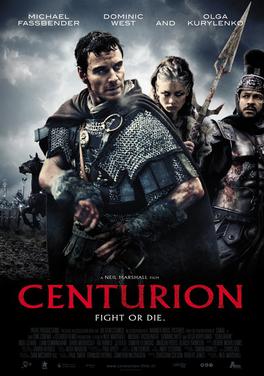
Centurion is a 2010 British historical action film written and directed by Neil Marshall, loosely based on the disappearance of the Roman Empire's Ninth Legion in Caledonia in the early second century AD. The film stars Michael Fassbender, Dominic West and Olga Kurylenko. It received mixed reviews and performed poorly at the box office, only earning half of its $12 million budget.
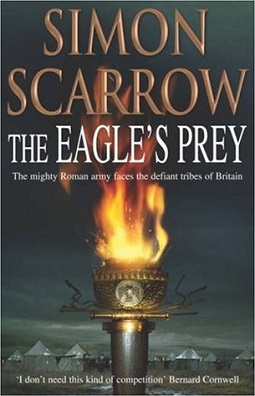
The Eagle's Prey is the fifth novel in the Eagles of the Empire series by Simon Scarrow. It was published by Headline Publishing Group in July 2004.
The gens Ennia was a family of Calabrian descent. It is known chiefly from a single individual, Quintus Ennius, a soldier, dramatist, and poet, whom the Romans came to regard as the father of their literature. Ennius was born at Rudiae, a village near Brundisium in Calabria, in 239 BC. He claimed descent from the ancient lords of Messapia. As a young man, he served as a soldier in the Roman army, rising to the rank of centurion. At the age of thirty-eight, he came to Rome in the train of Marcus Porcius Cato. Most of his works have been lost, or exist only in fragments, but he was greatly influential on later Roman writers, including Vergil.
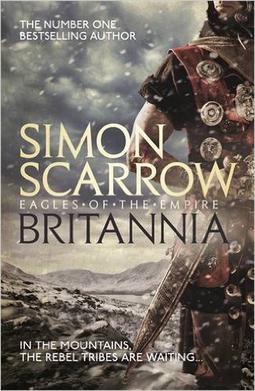
Britannia is the fourteenth novel in the Eagles of the Empire series by Simon Scarrow. It was published in 2015 by Headline in the UK.
Caesar's invasion of Macedonia occurred as part of Caesar's civil war, starting with his landing near Paeleste on the coast of Epirus, and continuing until he forced Pompey to flight after the Battle of Pharsalus.














